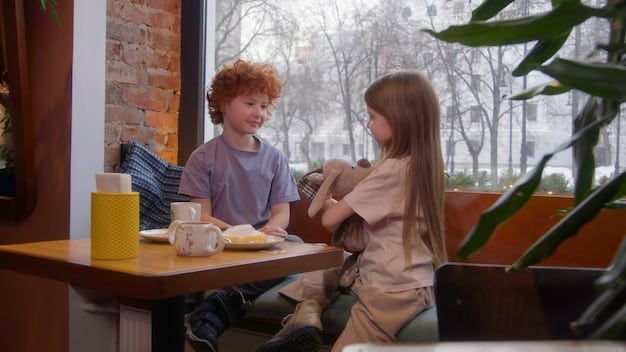Co-Parenting & Mental Health: Helping Your Kids Thrive

Co-parenting and mental health are intertwined, significantly impacting children’s well-being; recognizing signs of stress and implementing supportive strategies are crucial for fostering a healthy co-parenting environment, benefiting both parents and children involved.
Navigating life after separation or divorce involves more than just coordinating schedules; it’s about understanding how co-parenting and mental health: recognizing and addressing the impact on your children is vital since it directly influences their emotional well-being. This article delves into recognizing the signs of strain, offering practical strategies to foster a healthier, more supportive co-parenting relationship for the sake of your children.
Understanding the Interplay Between Co-Parenting and Mental Health
The emotional landscape following a divorce or separation is complex, with co-parenting often becoming a focal point. This delicate balance between parental responsibilities and personal well-being can significantly influence the mental health of everyone involved, especially the children.
Effective co-parenting requires open communication, mutual respect, and a shared commitment to the children’s best interests. However, strained relationships, conflicting parenting styles, or unresolved emotional issues can create tension, leading to increased stress and potential mental health challenges for both parents and children.

The Impact on Children’s Mental Health
Children are incredibly perceptive and can easily pick up on tension and conflict between their parents. Witnessing ongoing disputes or feeling caught in the middle can lead to anxiety, depression, and behavioral problems.
- Increased anxiety: Children may worry about pleasing both parents or fear causing conflict.
- Depression and sadness: The loss of the traditional family structure can lead to feelings of grief and loneliness.
- Behavioral issues: Acting out, defiance, or withdrawal may be a sign of underlying emotional distress.
- Difficulty with relationships: Children may struggle to form healthy relationships with others due to the instability they experience at home.
Minimizing conflict and creating a stable, supportive environment are crucial for mitigating the negative impact of co-parenting on children’s mental health. By prioritizing their children’s needs and working together constructively, co-parents can help them navigate the challenges of a divided family.
Recognizing Signs of Stress in Co-Parenting Dynamics
Identifying the signs of strain within co-parenting dynamics is crucial for addressing potential mental health concerns proactively. These signs can manifest in various ways, affecting both parents and children involved.
Being vigilant about these indicators allows for timely intervention and the implementation of strategies to alleviate stress and promote a healthier co-parenting environment. Open communication and a willingness to address these concerns are essential for the well-being of the entire family.
Signs in Parents
Parents experiencing increased stress in co-parenting may exhibit the following signs:
- Increased irritability or anger: Frequent outbursts or difficulty controlling emotions.
- Withdrawal and isolation: Avoiding communication with the other parent or social interactions.
- Changes in sleep or appetite: Difficulty sleeping or significant changes in eating habits.
- Feelings of hopelessness or despair: Experiencing persistent sadness or loss of interest in activities.
It’s also important to recognize signs of burnout, which can manifest as exhaustion, detachment, and a sense of ineffectiveness as a parent. Seeking support from therapists, support groups, or trusted friends and family members can be invaluable in managing these challenges.
Establishing Clear Communication Boundaries
Effective communication is the cornerstone of successful co-parenting, and establishing clear boundaries is essential for fostering a healthy and respectful environment. These boundaries can help minimize conflict and ensure that communication remains focused on the children’s needs.
Defining communication parameters, such as preferred methods of contact and acceptable topics of discussion, can prevent misunderstandings and emotional flare-ups. Consistency and mutual respect are key to maintaining these boundaries and promoting a more amicable co-parenting relationship.

Practical Tips for Setting Boundaries
Here are some practical tips for establishing and maintaining clear communication boundaries:
- Choose a communication method: Agree on preferred methods, such as email, text messaging, or a co-parenting app.
- Set response time expectations: Establish reasonable timeframes for responding to messages.
- Focus on the children: Keep communication focused on topics related to the children’s well-being.
- Avoid emotional language: Use neutral and respectful language in all communications.
By implementing these strategies, co-parents can create a more structured and predictable communication environment, reducing the likelihood of conflict and promoting a healthier relationship.
Prioritizing Self-Care for Co-Parents
Amidst the demands of co-parenting, prioritizing self-care is crucial for maintaining mental and emotional well-being. Co-parents who neglect their own needs may experience increased stress, burnout, and difficulty fulfilling their parental responsibilities.
Engaging in self-care activities can help co-parents recharge, manage stress, and approach co-parenting challenges with renewed energy and perspective. These activities can range from simple relaxation techniques to more involved hobbies and interests.
Self-Care Strategies for Co-Parents
Here are some effective self-care strategies that co-parents can incorporate into their routines:
- Schedule regular breaks: Take time for yourself to relax and unwind, even if it’s just for a few minutes each day.
- Engage in enjoyable activities: Pursue hobbies, interests, and activities that bring you joy and relaxation.
- Practice mindfulness and meditation: Use mindfulness techniques to reduce stress and improve focus.
- Seek support from others: Connect with friends, family members, or a therapist for emotional support.
By making self-care a priority, co-parents can enhance their own well-being and create a more positive and supportive environment for their children. Remember, taking care of yourself is not selfish; it’s essential for effective co-parenting.
Creating a Consistent and Supportive Environment for Children
Consistency and stability are paramount for children navigating the complexities of co-parenting. A predictable and supportive environment can help children feel secure and reduce the potential for anxiety and stress.
Co-parents can create a consistent environment by establishing clear routines, rules, and expectations across both households. This includes everything from bedtime schedules and mealtime habits to disciplinary approaches and communication styles.
Tips for Creating Consistency
Here are some tips for creating a consistent and supportive environment for children in co-parenting situations:
- Establish consistent routines: Maintain similar routines for bedtime, meals, and homework in both households.
- Communicate openly about rules and expectations: Ensure that both parents are on the same page regarding rules and consequences.
- Present a united front: Avoid undermining the other parent’s authority in front of the children.
- Provide emotional support: Offer a safe and supportive space for children to express their feelings and concerns.
By prioritizing consistency and support, co-parents can help children feel more secure and confident, even in the midst of a divided family structure.
Seeking Professional Help When Needed
While many co-parenting challenges can be addressed through open communication and proactive strategies, there are times when professional help is necessary. Recognizing when to seek external support is crucial for promoting the well-being of both parents and children.
Therapists, counselors, and mediators can provide valuable guidance and interventions to help co-parents navigate complex issues, improve communication, and resolve conflicts. These professionals can also offer support for children who are struggling with the emotional impact of co-parenting.
When to Seek Professional Help
Consider seeking professional help in the following situations:
- Persistent high conflict: Ongoing disputes that cannot be resolved through communication.
- Communication breakdown: Inability to communicate effectively with the other parent.
- Mental health concerns: Symptoms of anxiety, depression, or other mental health issues in parents or children.
- Difficulty co-parenting: Struggling to agree on parenting decisions or implement a co-parenting plan.
By seeking professional help when needed, co-parents can access the resources and support necessary to create a healthier and more sustainable co-parenting relationship, ultimately benefiting their children’s mental health and well-being.
| Key Point | Brief Description |
|---|---|
| 🛡️ Clear Boundaries | Establish communication rules for respectful interactions. |
| ❤️ Self-Care | Prioritize your well-being to better support your children. |
| 🤝 Consistency | Maintain similar routines across both households. |
| 👨⚕️ Seek Help | Don’t hesitate to consult professionals for guidance. |
Frequently Asked Questions About Co-Parenting
▼
High conflict between parents can cause anxiety, sadness, and behavioral issues in children. Minimizing disputes and maintaining a respectful environment is essential.
▼
Using a co-parenting app, setting response expectations, and focusing solely on children’s needs helps ensure productive and respectful conversations.
▼
Self-care helps reduce stress and burnout, allowing you to parent more effectively. It also sets a positive example for your kids.
▼
Establish consistent routines and rules in both households. Open communication about expectations reduces uncertainty and fosters security.
▼
Consider professional help if there is persistent conflict, communication breakdown, mental health concerns, or difficulty in co-parenting effectively.
Conclusion
Fostering a positive co-parenting environment is essential for children’s mental health. By prioritizing clear communication, consistency, self-care, and seeking professional help when needed, co-parents can create a supportive and stable environment, enabling their children to thrive despite the challenges of a divided family structure.





